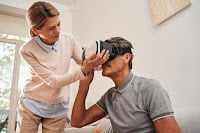A brief psychological therapy using virtual reality (VR) can help people overcome their fear of...
VR-Assisted Therapy Can Reduce Severity of Auditory Hallucinations

An immersive, virtual reality (VR)–based psychotherapy can help reduce the frequency and severity of auditory hallucinations in people with schizophrenia, according to a study appearing in Lancet Psychiatry.
Using VR in the treatment of hallucinations allows therapists to digitally embody the heard voice as a three-dimensional avatar, explained Lisa Charlotte Smith, Ph.D., of Copenhagen University Hospital, and colleagues. “This approach facilitates a dialogue between the voice-hearer and the avatar representing a dominant voice, with the therapist assisting the voice-hearer in gaining confidence in standing up to the voice,” they wrote. “The aim is to gradually alter the patient’s response to the avatar, resulting in a more assertive relationship.”
The researchers recruited 271 adults with a schizophrenia spectrum disorder from outpatient clinics across Denmark; all participants had been experiencing auditory hallucinations for at least three months. Participants were randomized to receive either seven sessions of the VR therapy (Challenge-VRT) over 12 weeks or enhanced usual care—which involved flexible assertive community treatment supplemented by seven additional support sessions.
Challenge-VRT is a manualized intervention comprising three phases: reclaiming power over the voice, improving self-worth, and recovery. In the VR sessions, patients engage in dialogues with their avatar, which is voiced by the therapist using a voice transformer; therapists can switch to their natural voice to provide support if needed. The VR dialogues last between two and 20 minutes, with the remainder of each 60-minute session used for preparation and debriefing.
After 12 weeks, participants receiving Challenge-VRT had statistically greater reductions in the severity and frequency of their auditory hallucinations compared with those receiving enhanced usual care. After 24 weeks, hallucination frequency remained lower in the Challenge-VRT group relative to the control group, though there was no longer any difference in hallucination severity.
Smith and colleagues noted that nearly 80% of participants completed the full Challenge-VRT course, and the intervention was generally well tolerated except for a temporary increase in auditory verbal hallucination symptoms during the initial phase. “Few serious adverse events occurred despite the sample consisting of patients who had, on average, experienced voices for 15 years, and for whom hospital admissions and self-harm were not uncommon occurrences,” they wrote.
For related information, see the Psychiatric News article “Virtual Reality Shows Promise in Patients With SMI.”
(Image: Getty Images/iStock/YakobchukOlena)
Don't miss out! To learn about newly posted articles in Psychiatric News, please sign up here.





